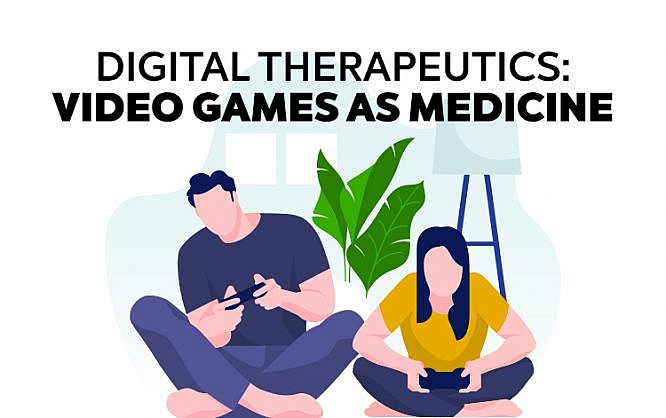Digital Therapeutics: Video Games as Medicine

Experts have predicted for the market of Digital Therapeutics (DTx) to reach $7.8 in value by 2025, with video gaming to be the industry's largest driver. DTx can provide many benefits, offering new healthcare options for patients with unfit needs, and may even help reduce their dependence on prescription medicine.
By using software-powered algorithms, DTx combines surgical tools and digital software to alleviate symptoms of ADHD, Autism, Multiple Sclerosis (MS), anxiety and major depression, Opioid and Substance Use Disorder, Essential Tremors, and Parkinson's Disease. In the future, DTx will be powerful enough to help patients with Lupus, ICU delirium, and traumatic brain injuries.
While the new technology is powerful and provides new medicinal insights, remember that it's always important to consult with your doctor before using - or changing - your medication. Here's how DTx works.
As previously mentioned, video games may help to play patient build key skills to shape their working memory, executive functioning, and selective functioning. I'll explain further. Your working memory is what gives you the ability to recall information, such as a to-do list. You use your executive functioning skills to manage your emotions, pay attention, and plan. Lastly, your selective attention skills give you the reach to process, filter, and respond to competing stimuli.
When combined, such as in the Akili Interactive’s Selective Stimulus Management Engine (SSME), medicinal gameplay can go on to help patients with their symptoms of Autism, ADHD, major depression, and MS. SSME gameplay was specifically designed to get the player in touch with their key skills (working memory, executive functioning, and selective attention). The engine was also built on adaptive algorithms that adjust to each player's individual skillset. As the player advances through the game, their sensory and motor stimuli are deployed. Doing so targets and activates key areas of the brain, building new neurological links as they continue practising the game.
On the other hand, gaming with biofeedback operators completely differently.
Specifically designed to treat anxiety, depression, ADHD, and Autism, gaming with biofeedback can measure a wide range of the patient's vitals. For example, biofeedback gaming systems are built with heart rate monitors, respirometers, temperature gauges, skin conductance level monitors, galvanic skin responders, and eye trackers. This form of gameplay adapts to the player's state of mind and requires mindful responses from the patient to continue advancing through the game's map.
For example, in the instance the patient becomes more anxious through gameplay, Mighteor technology requires the patient to independently relax before continuing with the game. On the other hand, Quotient technology slows gameplay as the patient's attention wanders. This requires the patient to practice selective focus so that their gameplay can return back to normal speed.
However, this isn't all. Developers are working on new gaming engines, such as the Spatial Navigation Engine (SNAV) and Affective Engine (AAFF) to help patients with Lupus, ICU delirium, and traumatic brain injuries.
The future of Digital Therapeutics will also include cutting-edge therapies to provide digital, cognitive-behavioural counselling to complement outpatient treatment. In 2018, Pear Therapeutics launched the first 2 virtual rehabilitation platforms to gain FDA approval. Their reSET platform helps patients overcome Substance Use Disorder, and the reSET-0 platform helps with Opioid Use Disorder (OUD).
In 2019, VRHealth, an Israeli startup, began diving into virtual reality to treat pain management - another way gaming is used as medicine. VRHealth found that Immersive Virtual Reality experiences distract patients from their pain. When combined with physical therapy, the patient can find the root of their underlying issues.
More interestingly, Digital Therapeutics also has a market for eye tracking, voice markers, and neurologic music therapy. Eye-tracking can help patients streamline Autism diagnosis and symptom levels; voice markers may help track Alzheimer's, depression, schizophrenia, and Parkinson's disease; and neurologic music therapy can improve the patient's motor, speech, and cognitive function after receiving a disease or injury.
Overall, video games as medicine can help patients practice essential skills from attention and memory to relaxation, all while having fun. Still, these aren't the only benefits Digital Therapeutics provide. Read more below for the full scoop on software-powered medicine.
Original Source: https://www.nursingschoolhub.com/digital-therapeutics-software-medicine/

Source: Nursing School Hub
Featured image by Freepik
